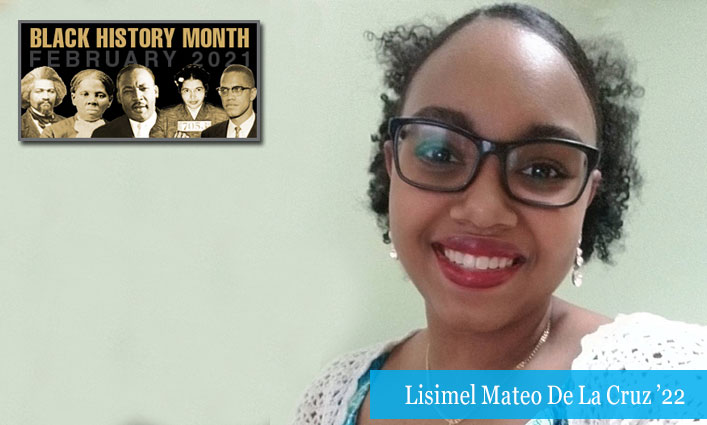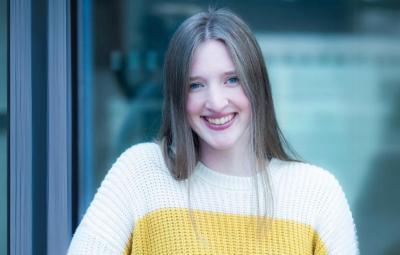
John Jay’s celebration of Black History Month traditionally culminates with our annual Malcolm/King Awards Breakfast, which pays homage to the two Civil Rights giants, Malcolm X and Dr. Martin Luther King, Jr., while also recognizing the incredible talents of our student award winners and present racial justice visionaries. While this year’s celebration may be a little different, the vigor in how we honor their legacy remains the same. In anticipation of this year’s virtual Malcolm/King Awards Breakfast on February 26, 2021, we spoke with the student award winners to understand what Black History Month means to them and to learn how they hope to advance the goals of justice and equality for all.
Lisimel Mateo De La Cruz ’22, a Macaulay Honors student and a Human Services and Community Justice major from the South Bronx, knows how to express herself through the power of the written word. Her submission for the Malcolm/King Award was a poem entitled “Until Then.” Through each stanza, Mateo De La Cruz expresses her understanding of the injustices that African-Americans have faced—throughout enslavement, Jim Crow, and current racial inequities—while also demonstrating the strength and determination of the African-American community. Her poem asserts, “We submit ballots. But we get bullets. We have dreams. But live in nightmares. When they go low, said Michelle, we must go high. But no matter where we go, we must remain in disguise.”
As a proud Afro-Latina, Mateo De La Cruz sees Civil Rights history, and the current fight against racial injustice, as part of her identity. When she talks about Civil Rights icons and current racial justice visionaries, there’s both reverence for their contributions and a determination to extend their progress. “They built a foundation for this country and continue to pave the way towards greater achievements that benefit the common good,” she says. “It’s important to celebrate past achievements because it fortifies our resilience and motivates us to move forward despite the hardships people of color face.” We sat down with Mateo De La Cruz to learn more about her aspirations for the future.
“As a country, we need to recognize that slavery is not over. Instead, it has evolved into a modern form in which Black and brown individuals are oppressed and their labor is used by society without their deserved compensation.” —Lisimel Mateo De La Cruz
What goals do you have for advancing equality and fairness for all people—especially African-Americans?
My future goals involve conducting research on how minority populations are at a disadvantage in the health care system and looking at ways to reduce this gap. I would also like to pursue further education in public health and public administration. I will continue to help serve my community and others through volunteer projects to solve societal issues such as racial discrimination, gender inequality, immigration stresses, and lack of equitable health care.
When you think of African-American history, what makes you the proudest?
I appreciate Stacey Abrams’ long-fought battle against voter suppression and her legacy as a woman of color. For hundreds of years, many have attempted to silence the voices of people of color. These voices have a right to be heard and Stacey Abrams serves her community in order to ensure that African-Americans have equal access to voting. We will look back in the future and recognize Ms. Abrams as one of the many pioneers that have worked toward liberating the voices of the silenced.
If you could talk to Malcolm X or Dr. Martin Luther King, Jr., what would you ask them? What would you want to say to them?
If I could talk to Dr. Martin Luther King, Jr. I would like to have a conversation with him about our current society. I would like to know his opinion on how he thinks our society has improved, what our society needs to work on, and what actions we can take to ensure the safety of people of color.
Dr. King once famously said, “Let us realize the arc of the moral universe is long, but it bends toward justice.” As a student at a school focused on justice, what does that quote mean to you?
To me, this quote means that the end goal of all our efforts should be justice for all. For true justice to prevail, we must acknowledge that all individuals, regardless of skin color, must benefit from it. We must recognize what is morally just from what is morally unjust and in doing so, we take a step forward on the path that leads to justice.
“To have my words serve as an inspiration for others is truly an inspiration for me to continue my work.” —Lisimel Mateo De La Cruz
The last 12 months have been challenging, with a global pandemic that has disproportionately affected our Black and brown communities, and a national reckoning on systemic racism. What steps can we take to move forward as a society and a country to make equality for all achievable?
A lot has happened in the past year, and so it’s important for us to take a step back and unpack what’s going on. Problems such as systematic racism and racial inequality are not new. They are stems that stick out of the deep-rooted issues this country has been built upon. My instructors would always tell me, “You can’t put a bandage over a bullet wound.” The same thing can be said about racism in this country. We can’t cut off a stem by passing a law and expect the stem not to grow out again. In order to make equality for all achievable, and to move forward as a society and a country, we must start at the roots of the problem. As a country, we need to recognize that slavery is not over. Instead, it has evolved into a modern form in which Black and brown individuals are oppressed, and their labor is used by society without their deserved compensation.
What does being named a winner of the Malcolm/King Scholarship mean to you?
It is a huge honor for me to be a recipient of the Malcolm/King Scholarship award and to be amongst the amazing works my peers have produced. To have my words serve as an inspiration for others is truly an inspiration for me to continue my work. Freedom of speech is a right that we all have and our words can be used to hurt or to heal. I hope we can all actively choose to use our rights and our words to heal one another and slowly rebuild and repair our society.
“I hear the voices that systems of oppression aim to silence. I aim to be a speaker so that those voices can be amplified and heard loud and clear.” —Lisimel Mateo De La Cruz
If everything goes according to plan, where do you see yourself in 10 years?
As I mentioned in my poem, the future is truly a mystery. My purpose is to foster respect, tolerance, unity, and inclusivity and to serve as a representative figure for Latinos and all people of color. In 10 years, I hope I am in a position where I can improve the services our Black and brown communities deserve to have by making sure that they are accessible and affordable. I recognize that I am in a position where I can help others and I intend to do so to the best of my ability. Like Stacey Abrams, I hear the voices that systems of oppression aim to silence. I aim to be a speaker so that those voices can be amplified and heard loud and clear.



